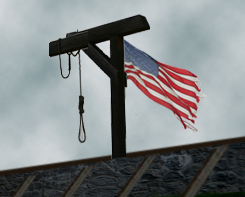Home / Death Penalty
Two murderers were sentenced in federal courts in Missouri yeterday.
Lisa Montgomery got the death penalty in federal court. She will be the third woman on federal death row. Her crime: She cut the fetus out of a woman who was 8 months pregnant. She wanted the baby because she had told her husband she was pregnant and felt she had to produce one. She is mentally ill, likely a result of the sexual abuse she suffered as a child. The baby lived and is healthy, and has been returned to the family.
Other women on federal death row:
Since 1927, only two women have been executed under the federal system, both in 1953. Ethel Rosenberg was the first, sent to the electric chair after her and husband Julius were convicted of conspiracy to commit espionage for passing atomic secrets to the Soviet Union.Bonnie Heady was sent to the gas chamber with her lover Carl Hall for the kidnapping and murder of a 6-year-old boy in Kansas City. Mary Surratt was hanged by the U.S. government in 1865 for her involvement in the conspiracy to assassinate President Lincoln.
Timothy Krajcir, 63, is a serial killer who pleaded guilty to murdering five woman on separate occasions. He got a life sentence by making a deal to plead guilty in exchange for the Government not seeking the death penalty. [More...]
(24 comments, 503 words in story) There's More :: Permalink :: Comments

There's progress on the death penalty front to report:
VA Governor Tim Kaine has imposed a moratorium on executions until the Supreme Court decides Baze v. Rees on whether lethal injection is cruel and unusual punishment.
Kaine said about 30 executions nationwide have been stayed since September, either by the Supreme Court, lower courts or governors.
In Missouri legislators are considering a bill that would impose a moratorium on executions until 2011 so that death sentences in the state can be reviewed.
Besides the freeze, the measure also would create a 10-person commission to study a random sample of death penalty cases to judge the fairness of the process. The panel could look at topics such as possible racial disparities and the quality of evidence used to convict the person.
More....
(30 comments, 428 words in story) There's More :: Permalink :: Comments
The New York Times examines why the feds have been so unsuccessful in getting death penalty convictions in New York State.
In the 20 years since the federal death penalty statute was revived, no federal juries have been more reluctant to sentence federal defendants to death than those in New York.
The Justice Department's losing record in New York: 19 to 1, since 1988. Nationally, the feds win about 1/3 of their capital cases.
One reason is the reluctance of jurors to impose it. Another is the quality of the New York capital defenders. A third is the sometimes unsympathetic victims.
But there's more. The Judges are weighing in, on everything from the exorbitant expense to the arbitrariness and disparity in the system. More...
(11 comments, 625 words in story) There's More :: Permalink :: Comments
Today, U.S. Attorney General Michael Mukasey showed he might be taking a different tack. North Dakota U.S. Attorney Drew Wigley announced today that Mukasey had rejected seeking the death penalty against several defendants in a drug conspiracy case involving an alleged murder:
The decision was announced Friday by U.S. Attorney Drew Wrigley, after he received a letter from U.S. Attorney General Michael Mukasey. Wrigley said it was a short statement by Mukasey."He now sets the record for the most direct of the three attorneys general I've worked for. I'll leave it at that," Wrigley said.
The latest decision came in the case of defendant Martin Avila, age 21, accused of being a fugitive and a meth trafficker who used a firearm to kill Lee Avila of East Grand Forks, Minn. Avila is one of "more than 60 people charged in the case known as Operation Speed Racer."
Mukasey also rejected death filings against three other defendants accused in Avila's death.
"The facts are obviously well-known to them," said Wrigley, referring to the Justice Department. "We put together an entire synopsis with every possible aspect of the case and they considered it very thoroughly (in the death penalty decision)."
(3 comments) Permalink :: Comments
U.S. District Court Judge Clarence Brimmer in Wyoming has overturned a state death sentence and ordered a new trial for inmate James Harlow who was convicted of murdering a prison guard in 1997. Among the myriad of reasons:
In a 230-page ruling, Brimmer stated that Harlow was denied a fair trial in state court because conflicts between his original lawyer, Keith Goody, and the former state public defender Sylvia Hackl. The judge said that Goody was made to fear he would be fired for doing his job and insisting on more resources to defend Harlow.
[More...]
(4 comments, 249 words in story) There's More :: Permalink :: Comments

The Nebraska Supreme Court yesterday ruled that the use of the electric chair to execute inmates constitutes cruel and unusual punishment.
The evidence shows that electrocution inflicts "intense pain and agonizing suffering," the court said. "Condemned prisoners must not be tortured to death, regardless of their crimes," Judge William Connolly wrote in the 6-1 opinion.
"Contrary to the State's argument, there is abundant evidence that prisoners sometimes will retain enough brain functioning to consciously suffer the torture high voltage electric current inflicts on a human body," Connolly wrote.
Nebraska is the only state in the country still using the barbaric method of execution. The legislature must now authorize another means before the state can put anyone to death.
Any chance there are any legislators in Nebraska who will say, "Choose Life, End the Death Penalty?"
(12 comments) Permalink :: Comments

There's an editorial today by three physicians in the New England Journal of Medicine. Shorter version: Regardless of what the Supreme Court decides in Baze v. Rees, physicians should not participate in executions.
This spring the U.S. Supreme Court in Baze v. Rees1 will rule on the constitutionality of the three-drug regimen currently used for lethal injection in most state executions. The Eighth Amendment to the U.S. Constitution prohibits punishment that is "cruel and unusual." The central question before the Court in Baze is whether the use of sodium thiopental, pancuronium bromide, and potassium chloride violates that constitutional prohibition.
More...
(5 comments, 542 words in story) There's More :: Permalink :: Comments

We've written before about the problems in Missouri with executioners -- most notably, the dyslexic doctor who administered the fatal cocktail.
Now, the New York Times recaps last week's St. Louis Post Dispatch article about a nurse on the state's execution team who had a criminal record and was on probation:
Before a Missouri executioner could go to Indiana in 2001 to help federal authorities put mass killer Timothy McVeigh to death, he had to take care of one detail:
He needed permission from his probation officer to leave the state.
The Post-Dispatch named the nurse, even though a state law was passed after the dyslexic doctor was identified prohibiting disclosure. The paper explains why it is naming the nurse: [More...]
(4 comments, 432 words in story) There's More :: Permalink :: Comments
In this AP story, "America's Most Wanted" host John Walsh complains that fugitives who flee from the United States into Mexico escape justice by evading the death penalty. Pursuant to treaty, Mexico (like Canada and other countries) will not extradite a fugitive who might be put to death.
"It's not about revenge. It's not so much about closure. It's about justice," [Walsh] said.
Obeying a treaty obligation isn't unjust. Death is an extreme punishment inconsistently administered in an imperfect criminal justice system. The treaty respects Mexico's sovereign right to make its own judgment about extradition while assuring a mechanism to return fugitives for trial and punishment. Doesn't that sound like justice to you?
(21 comments) Permalink :: Comments

I'm listening to the Supreme Court oral arguments in the Baze lethal injection case (Baze v. Rees (07-5439.) Justice Stevens is questioning the lawyer for the Kentucky Department of Corrections.
Justice Stevens just asked the lawyer for Kentucky about why veternarians won't even use the procedure on dogs. (Background, You Wouldn't Do a Dog This Way.) Justice Roberts jumped in and the KY lawyer said if you drop the first drug, which they've done, it's all fine and good.
Justice Stevens says he's concerned the second drug is also problematic.
Justice Ginsberg asks why they pick non-professional people to administer the drugs. (Doctors and nurses are banned. )
Sentencing Law and Policy has been following the case closely. How Appealing has gathering of news articles.
Here's an article on the lawyers arguing the case. The defense lawyer is a 29 year old public defender. [More...]
(6 comments, 238 words in story) There's More :: Permalink :: Comments


Sixty percent of all executions in 2007 were performed in Texas. Elsewhere, the number of executions dropped.
Of the 42 executions in the last year, 26 were in Texas. The remaining 16 were spread across nine other states, none of which executed more than three people. Many legal experts say the trend will probably continue.
One law professor predicts in the not too distant future, all executions will be Texecutions. Perhaps he's right as New Jersey and other states are beginning to see the light.
There do seem to be slight stirrings suggesting that other states might follow New Jersey. Two state legislative bodies — the House in New Mexico and the Senate in Montana — passed bills to abolish capital punishment, and in Nebraska, the unicameral legislature came within one vote of doing so.
If you haven't checked out the Texas Department of Criminal Justice death page recently, it's here. Last meals are no longer listed -- instead you can read the last statements of those put to death.
(2 comments) Permalink :: Comments
Two former South Carolina prison executioners have sued the state's top prison officials in federal court alleging they were forced to conduct executions even though they were not trained to do so. They also claim that had they refused, they would have lost their jobs or been demoted.
Neither man was trained or prepared for using the electric chair, the suits allege, "with its shocking smell and scene of agony." And neither man was offered counseling, the suits allege.
"Although these executions were barbaric, gruesome and repulsive to the plaintiff, he continued to perform them under the implied threat by the defendant Ward that such service was necessary if he was to continue to act as team leader and to receive the salary supplement and other benefits of his major’s position," Baxley’s suit alleges.
(3 comments) Permalink :: Comments
| << Previous 12 | Next 12 >> |







